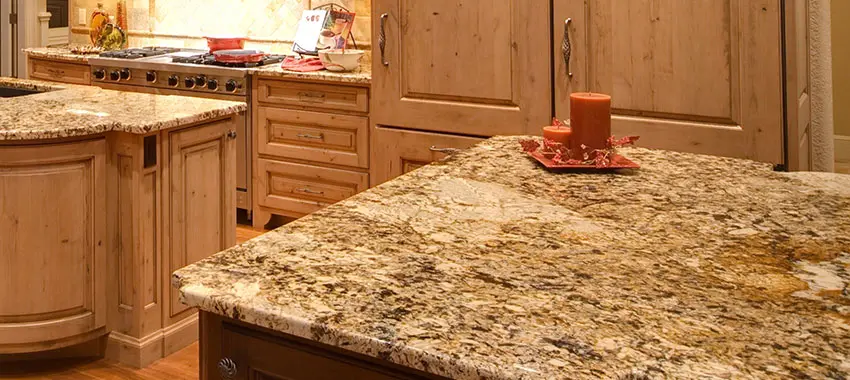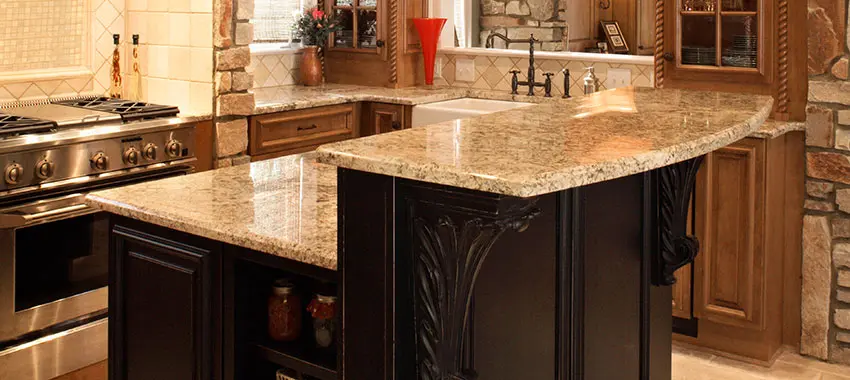Oct
11 Interesting Things To Know About Granite Countertops
- 2023
- FlintStoneTops
Granite is one of the most popular kitchen countertop materials. That’s a pure fact. It will be the favorite choice for many and for a few, they may be overrated. Anyways, following are some interesting things about granite countertops that should know.
Granite Is A Natural Stone
A natural stone is something that’s quarried out of the ground. Not a lot of people know about this fact of granite or granite countertops, but it’s a natural stone that makes these countertops such a treat for the eyes.
There is just something about a natural stone that’s so unique because no two slabs will ever be the same and there will always be something unique about each slab of granite countertop you have in your kitchen whether it be the mosaic pattern or the veining.
It Is The Oldest Rock
Granite is a very old rock. If you know anything about rocks and geology, then you would know that granite is quarried from a decent depth in the Earth. And the reason why is because it’s very old. The average age of granite that’s quarried for countertops is about 300 million years old. For reference, the asteroid that hit the Earth and killed dinosaurs was 65 million years ago.
So, it’s safe to say that if you’re choosing granite countertops for your kitchen, then they’re nothing less than a very precious artifact that can date back millions of years and that’s jaw-dropping when you think about it.
Granite Is An Igneous Rock
Another interesting thing to know about granite is that it’s made by the cooling and solidification of magma. Magma is the molten hot substance that’s found deep inside the Earth’s surface and once it cools, it can form rocks, granite being one of them, based on different compositions.
This process of cooling and solidification of magma to form rocks gives birth to rocks which are known as igneous rocks. So, in essence, granite is an igneous rock.
It’s A Latin Name
Have you ever wondered where the name “granite” came from? Well, to break it down for you in an easier way, granite is derived from a Latin word, “granum” which means “coarse grain”. If you think about it, the meaning of the word fits quite nicely with the properties of granite. Granite is a thick and coarsely-grained rock and it is rough and tough.
In fact, the name “granite” was proposed because of the very quality of the stone itself, which is quite interesting to think about.
The Composition Of Granite
A lot of people think that granite is a derivation of magma and that it is composed of magma. We also explained that earlier in this blog. Well, this is true, but let’s go a bit deeper this time. If you think about it, the composition of granite is different from what people think.
Granite is made up of quartz, feldspar, pulverized minerals, and mica. Quartz and feldspar are two main constituents found in the deep layers of Earth and feldspar is a main component of magma. Mica, on the other hand, is added to impart color to the stone, giving granite its characteristic color and appearance. There is a huge variety of mica that can be incorporated in granite which in turn can lead to different colored granite slabs.
Granite Countertops Are The Hardest
Granite is considered to be the hardest countertop surface material used in the kitchen. It has a hardness of 6-8 on the Mohs hardness scale and it’s pretty up there with diamond, the hardest rock on the planet with the hardness level of 10 on the Mohs scale.
This quality of granite is owed to the immense heat and pressure under which magma is cooled and formed into rocks and this is what gives granite its strength and durability. If you invest in granite countertops for your kitchen, then you can rest assured that they’re going to last you a long time.
The Countertops Are Durable
Along with hardness, granite countertops are also quite durable. Durability is a great feature of this rock and it’s one of the biggest selling points of granite. Granite, once installed in your kitchen, can last up to 60 years if maintained properly.
Durability is a huge deal for people and they want something that’s going to outlive everything else. Because granite is expensive and people spend a mini fortune on it, it’s only fitting for the countertops to last for a long time without any major problems. All you need to do is seal the stone every few years.
Knives Can Get Damaged By Granite
Granite is a hard material and while you can scratch it a bit with your knife, the rock will be doing a great deal of damage to your knife as well. Granite is known to ruin and break knives if the two things are always in contact with each other. A sharp knife can get blunt in no time if you’re constantly using it on the surface of granite.
This is why it’s advised to use a cutting board for any chopping and slicing because granite countertops can quickly damage your knives to the point of no return, and that’s quite something. And of course, the granite surface and the seal can be damaged by the knife as well if you use the knife directly on the countertop.
Countertops Are Naturally Fractured
The beautiful veining you see on the surface of granite, which is a major attractive feature of the rock itself is a fault. These are natural fissures and fractures present on the topmost surface of granite that are later filled with mica and give rise to an intricate veining pattern.
Granite, because it’s formed under high temperatures and pressures, can easily get cracked and form fissures on the surface. This is also what makes this rock porous, which is why you need to seal it to make it waterproof. Talk about an imperfection being this beautiful.
Heat Resistant Countertops
Granite countertops are also quite resistant to heat. Since they’re made inside the Earth where temperatures are higher than in any man-made furnace, granite can sustain high degrees of temperature without getting damaged and that’s a great quality. Heat resistance is important to think about when getting countertops for your kitchen because there is handling of all types of food on the countertops and you’re not always careful or mindful about not putting hot things on the countertop surface.
With granite countertops, you don’t need to worry about anything, because it’s going to sustain the high cooking temperatures and your countertops will always remain good as new. But to protect your countertop, don’t get carried away by the fact that granite is an ingenious rock and don’t put hot pans directly on the countertop.
Adds Value To Your Home
If you have granite countertops in your kitchen and you’re thinking about selling the house, then be prepared to get a lot of offers that will sound too good to be true. Granite is one of the few materials that can add value to your house.
It is an extremely popular material among people and they will appreciate the fact that the kitchen of the house they’re trying to buy already has granite countertops. You will get a good deal for your house.
Conclusion
Granite is a durable countertop material and it’s loved by the masses. These interesting things will surely pique your interest in this material. And if you want to see it in your kitchen, well, get in touch with granite installers Potomac.



